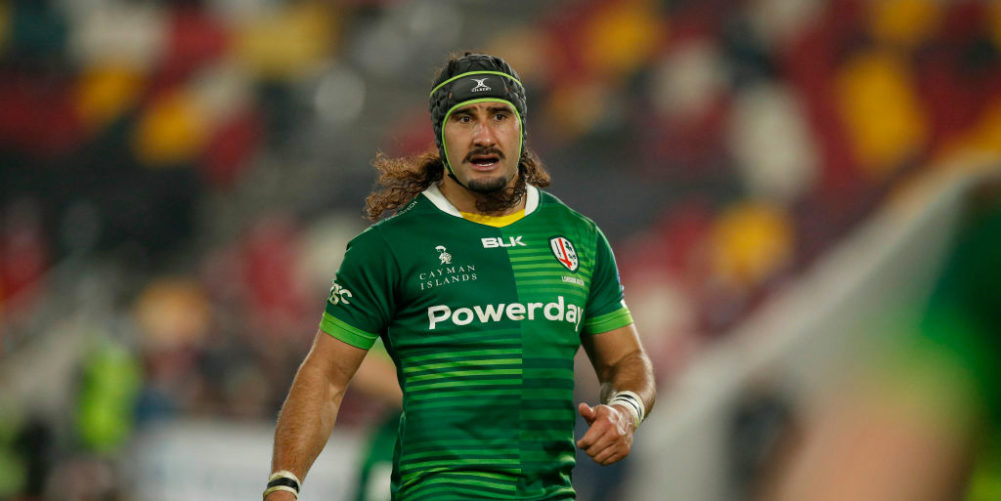London Irish chairman Allan Robson has vast experience in professional club rugby, having previously been involved at Richmond and Northampton Saints. On a momentous day for the Exiles, he offers NEALE HARVEY his opinions on the state of the game.
It was your first game at Brentford on Sunday, how significant an occasion is this for London Irish?
It’s the start of a new era. We’d been at the Madejski Stadium for 20 years and had moved away from our London roots, so it never felt like home. This definitely feels like home now.
It’s still a shared stadium, so how does this relationship differ?
In Reading there were a number of features around the agreement that made us appear like guests rather than shared owners. Brentford FC have a totally different, collaborative attitude where we’ve both set out from the start to ensure that this is our home as well. On a matchday it will be London Irish’s stadium and it’s an excellent relationship we have. We’ve been enthusiastically welcomed by the community and we’re desperate to get people in.
We hear a lot about a vast Irish diaspora waiting to support London Irish. Does that really exist?
Yes. There are lots of Irish people and people of Irish heritage in London and, more importantly, there are lots of them who want to see top-class rugby as well. We’re going into a heavily populated area and for them to have top-class rugby on their doorstep is brilliant. London Irish has been a lot of people’s No.2 team for a long time and there’s an opportunity now to become their No.1.
You’re surrounded by Premier League and Championship football clubs, not to mention Harlequins, Saracens, Ealing, Richmond, London Scottish etc. Is there room for another club?
Look, club rugby isn’t going to get crowds of 40,000-60,000 like football but there is room for another rugby club attracting crowds of 12,000-15,000, and that’s what we aspire to. My background for a long time was with Northampton Saints and I came to London Irish because I always knew that the untapped potential for the club was huge. I see no reason why we shouldn’t attract crowds of 11,000 quite quickly and with a capacity at Brentford just shy of 17,500, I think we will be hitting that within three years. You’ve obviously got to attract people through success and we started that journey when we took on Declan Kidney and Les Kiss in March 2018. We need to win and need to be attractive to watch, but they’ve concentrated very hard on recruitment and I think we’ve got the best squad the club has seen for a long time. We believe we can be a force to be reckoned with.
What shape are Irish in financially? Presumably, you’re still heavily reliant on your long-serving president, Mick Crossan?
Mick’s our majority shareholder and the club has been totally reliant on him for many years now. It’s no secret that virtually the whole of Premiership Rugby, even before Covid, was making losses and even Northampton, who when I was there made profits for 16 or 17 years, have now moved into a loss-making situation. Amid rising salary levels with players, the business model has meant that, barring perhaps Exeter, all clubs have struggled and London Irish are no different. We would welcome anyone else who was interested in investing in our club and joining Mick in sharing the cost burden, as well as the fun, excitement and energy that you get from being part of a professional rugby club.
The government has pledged £59m in grants and loans to assist the Premiership clubs through Covid. What are your thoughts on that?
£59m doesn’t sound a bad figure but you do have to divide that by the whole of the Premiership. We don’t yet have the precise detail of how that money will be divided up but, essentially, it’s there to compensate clubs for the decision not to allow spectators in from October 1 when in fact we’ve been losing money since the first lockdown in March. It doesn’t take into account those losses between March and September, which run into many millions, so in actual fact it’s not an awful lot of money. Clubs were in jeopardy, though, and this money has just bailed us out and will enable us to move on into the New Year when, hopefully, we can prove to the government that we can get spectators back in more substantial numbers than the 2,000-4,000 that have been announced.
Do you see the £59m being divvied-up equally?
Not sure. For clubs like Leicester who get crowds of 20,000, that’s an awful lot of revenue they’ve lost and it’s hurting them very, very badly, so I’m not sure it’s as simple as dividing the money 12 or 13 ways. We were all asked to submit our financial forecasts to DCMS and that £59m, I’m expecting, will reflect the figures we all put through. Therefore, one would expect our share to be relative to all our forecasts across the league.
You mentioned the Premiership club business model and there have been steps to reduce the salary cap to £5m plus add-ons in 2021/22, but does that go far enough?
The salary cap has been a burning issue for many years and among its main objectives is to create competitiveness within the league while enabling us to remain competitive in Europe and bring in some star quality from around the world. Most importantly, though, it’s to enable us to balance the books and we still haven’t got there. The salary cap levels are being reduced because of Covid and clearly that’s realistic, but some spectators may be reluctant to come back in the short term so our revenue pick-up is unlikely to be immediate. We have to be very careful right across the board now – including players, coaches and staff – to be realistic about salaries and understand we’ve all got a part to play in the solution. I don’t think we’re near to correcting the business model yet unless we’re prepared to keep relying on benefactors such as Mick Crossan.
How do you want to see the business model changed?
We’d hoped we’d already started down that path when CVC came in as significant shareholders in Premiership Rugby. They’re very much a commercially-driven business that convinced us they’d be able to drive our revenues to a significantly higher level. We believe that potential remains untapped – Covid has stymied things, but hopefully just for a short while.
Assuming the Premiership’s reliance on owners continues, would you advocate some added security through ring-fencing a 13 or 14-team Premiership?
I would, simply because of the threat to the whole professional club rugby business model. We’ve already mentioned Mick Crossan’s support for London Irish but you can look through all the other clubs and there are one or two people within each who are keeping their clubs going as well – and incidentally, I don’t think they get enough credit for what they do. It’s their money and there’s a limit to what anyone can do, so what we don’t need now are these guys walking away from our business and not being able to find replacements because of our stubborn refusal to accept change. The whole business is under threat and if we lose one club we start to detract from the strength of the group and then we’re all at risk, so I think ring-fencing is crucial.
How so, can you expand on that?
Newcastle will tell you what the cost of relegation is and London Irish were recently in the Championship for two seasons out of three. The issue is there is just no business model that enables the Championship to be successful financially so what we need is a better hierarchy structure, but we can’t have that while we have top-flight clubs constantly under threat. You’re in a financial wilderness in the Championship and it does prevent investors coming on board. It also prevents investors who are already on board from putting more money into a club. The Premiership is so competitive from top to bottom now that no one can feel safe and if you do happen to get relegated, it can be the beginning of the end, particularly at a time like now when the entire game is struggling.
So, are you suggesting ring-fencing just the existing 13 Premiership shareholders, including Saracens?

There are 13 clubs that have made up the Premiership over the years and have made significant investments for the business of Premiership Rugby. Ring-fencing, if we’re going to call it that, should involve all 13 clubs in an expanded league and if there’s another club with the requisite ambition on the playing and financial side to join that group in future, I don’t think we would have any issue with that at all. People mention Ealing and they have been the standout Championship club over recent years, but there’s an enormous gulf between the investment Ealing have made and what’s required to genuinely compete with the 13 Premiership clubs.
Okay, so what about this talk of Ealing buying their way in for, say, £20m. That sounds excessive?
Owners of the Premiership over the years have built up an equity in the competition and one of the arguments is, would it be really fair for those people to have put all this money, effort and heartache over a period of 21 years into building a world-class competition and product, only for someone else to just walk in and say, ‘I’ll share that with you from now on’? I think you’ve got to make your investment to put yourself on a fairly even base because then you’d be welcomed in with open arms. If you’re serious, I do think that commitment is important.
Would you like to see a franchised model or simply a moratorium on promotion and relegation?
Close the league off, moratorium, they’re all of a similar nature. The fact of the matter is there is not one other club outside the 13 who could justifiably say they could compete with those Premiership teams. As much as we’d be quite happy if someone said they could take part, each year at the moment one Premiership club with a top-class structure, that has spent a fortune over many years developing itself, has to spend a year outside the top-flight. Ealing, if they up the ante and recognise the need to buy-in to share what the Premiership clubs have already built, are the only likely people to challenge that at the moment so, yes, a moratorium is sensible. It gives Ealing, Doncaster or whoever the opportunity to build something over a period of time and then get a shot.
You mentioned Saracens, are you convinced that stringent new salary cap regulations will put a halt to any future cheating?
I think so. The powers are far more wide-ranging now and, perhaps more importantly, when the Saracens stuff all came out you could see the unity and determination of all the other clubs that this was totally unacceptable and that Saracens had to be meted out serious penalties. We had to take away the possibility of this ever happening again. The Lord Myners report looked into the issue in great detail and we’ve come up with a very stringent set of regulations now which really make it much more difficult to cheat the system. There’s more of an open book policy and psychologically the clubs are more together now. Saracens have changed a number of boardroom and executive positions and, hopefully, their culture is now aligned with the other 12 clubs.
Was there previously a naivety that clubs would just follow the salary cap rules?
Maybe so. If we did previously suspect some cheating, we hoped it was just around the edges so that’s where we were probably a bit naïve because we didn’t want to see the worst in ourselves, which is what we eventually got with Saracens because we didn’t move as fast as everyone would have liked. However, the brazenness of their cheating has pulled everyone together now and hopefully put any threat of this happening again behind us.
Premiership Rugby has taken a huge hit in 2020, so how confident are you you’ll secure a good TV deal when BT Sport’s current one expires next year?
Negotiations are being dealt with by PRL executive and Covid must have done some damage, but BT have served the Premiership and its supporters pretty well over the last few years and the coverage has developed. It’s been excellent during the Covid period. BT obviously believe there’s a pent-up demand to watch rugby and if they’re getting good audience ratings, they’ll hopefully pay more for what is a very good product.
Do you welcome Amazon’s venture into televised rugby?
If you look at how Amazon have changed the retail market during Covid, they’re just going from strength-to-strength at the expense of traditional retailers. It’s no surprise that they’ve moved into broadcasting and just as they’ve turned the world’s retail model upside down, they could well do the same with sports broadcasting and that competition is to be welcomed.
What do you see as the Premiership’s priorities in 2021?

Firstly, we’ve got to keep people safe, but then it’s about steadying the ship financially and the things we’ve talked about with TV deals and ring-fencing come into that. We’ve got to get crowds back to proper levels and then address the business model. Some clubs have been making losses for far too long so we need the economy to stabilise and then, with CVC and their efforts on our behalf, we’d hope to start making the gains we need to achieve a virtuous circle between revenue and expenditure. There’s some very good rugby in the Premiership and we have a good product to develop and sell, which in turn will benefit England and the RFU.
Dylan Hartley has highlighted the demands on players, mentally as well as physically. Is that an increasing threat?
It is, but I think we’re dealing with it. Medical science is so much better now that we we’re able to recognise issues with players more quickly than we once did. Professionalism meant the physicality of players rocketed but clubs now recognise how careful we need to be not to overplay people and our medical staff, coaches and players themselves are wiser. You can’t expect guys to be battering rams week-in, week-out and Declan Kidney has made it clear that he will rotate our squad. What that means is you need better and bigger squads moving forward.
Finally, you’ve been involved in Premiership Rugby for over 20 years, so how do you think it will look in another 20?
Football will remain the No.1 sport, no question, but the more people see rugby first hand, where you can feel the heat of the tackles and the speed the game’s played at, the more people will love it and gravitate towards it. I have no idea how the season structure might look as those discussions are always ongoing, but it’s a brilliant game and with CVC working with the clubs in different competitions and potentially becoming involved in Test rugby as well, I believe the support base will increase significantly. I hope London Irish will be at the forefront of that.

























